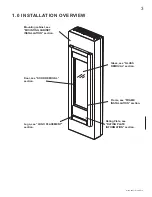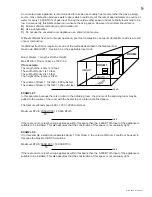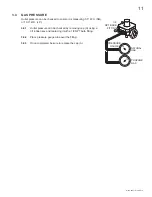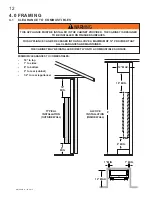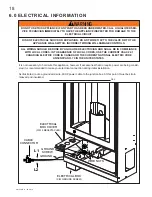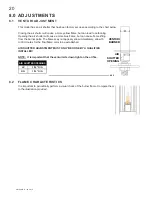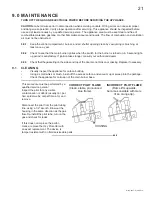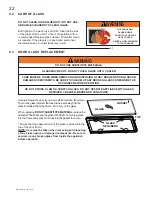
8
W415-0847 / A / 06.08.10
3.0 INSTALLATION
3.1 COMBUSTION AND VENTILATION AIR PROVISIONS
17.1A
This appliance shall not be installed in a con
fi
ned space or unusually tight construction unless provisions are
provided for adequate combustion and ventilation air.
The National Fuel Gas Code, ANSI Z223.1
/ NFPA 54
de
fi
nes a con
fi
ned space as a space whose volume is
less than 50 cubic feet per 1,000 Btu per hour (4.8 m3 per kw) of the aggregate input rating of all appliances
installed in that space and an uncon
fi
ned space as a space whose volume is not less than 50 cubic feet per
1,000 Btu per hour (4.8 m3 per kw) of the aggregate input rating of all appliances installed in that space.
Rooms communicating directly with the space in which the appliances are installed, through openings not
furnished with doors are considered a part of the uncon
fi
ned space.
The GVFT8 is rated at 6,000 BTUs per hour for natural gas and propane and therefore requires a minimum
uncon
fi
ned space of 300 cubic feet.
3.2 DETERMINING CONFINED OR UNCONFINED SPACE
This appliance shall not be installed in a room or space unless the required volume of indoor combustion air
is provided by the method described in the National Fuel Gas Code, ANSI Z223.1 / NFPA 54, the International
Fuel Gas Code, or applicable local codes.
To determine the volume of the room where the appliance is to be installed, multiply the width x the length x
the ceiling height of that room measured in feet. If any adjoining rooms are connected by grilles or openings
such as kitchen pass-throughs, etc., the volume of those rooms may be added to the total.
Multiply the room volume by 1000 and divide this amount by 50 to determine the maximum BTU/hr that the
space can support with adequate combustion and ventilation air.
Add the Btu/hr of all fuel burning appliances located within the space such as gas furnace, gas water
appliance, etc. Do not include direct vent gas appliances which draw their input and output air from and to the
outdoors.
Unusually tight construction is de
fi
ned as construction where:
A)
Walls and ceilings exposed to the outside atmosphere have a continuous water vapour retarder with a
rating of 1 perm (6 x 10-11 kg per pa-sec-m2) or less with openings gasketed or sealed, and
B)
Weather stripping has been added on openable windows and doors, and
C)
Caulking or sealants are applied to areas such as joints around window and door frames, between sole
plates and
fl
oors, between wall-ceiling joints, between wall panels, at penetrations for plumbing, electrical,
and gas lines, and at other openings.
!
WARNING
IF THE AREA IN WHICH THE APPLIANCE MAY BE OPERATED IS SMALLER THAN THAT DEFINED AS
AN UNCONFINED SPACE OR IF THE BUILDING IS OF UNUSUALLY TIGHT CONSTRUCTION, PROVIDE
ADEQUATE COMBUSTION AND VENTILATION AIR BY ONE OF THE METHODS DESCRIBED IN THE
NATIONAL FUEL GAS CODE ANSI Z2
23.1/ NFPA 54 , AIR FOR COMBUSTION AND VENTILATION, OR THE
APPLICABLE LOCAL CODE.
IF THE AREA IN WHICH THE APPLIANCE MAY BE OPERATED DOES NOT MEET THE REQUIRED VOLUME
FOR INDOOR COMBUSTION AIR, COMBUSTION AND VENTILATION AIR SHALL BE PROVIDED BY ONE
OF THE METHODS DESCRIBED IN THE ANSI Z223.1 / NFPA 54, THE INTERNATIONAL FUEL GAS CODE,
OR APPLICABLE LOCAL CODES.



